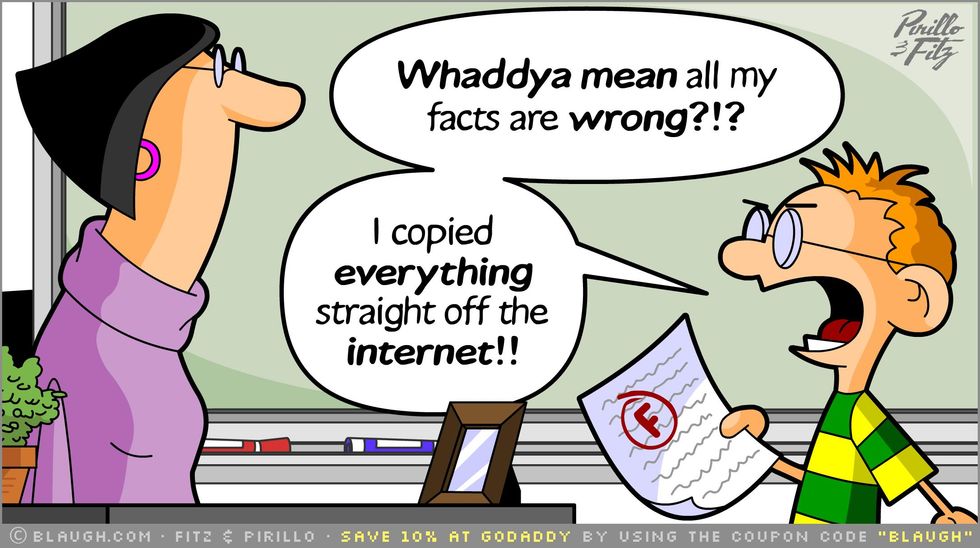Plagiarism is a big issue on college campuses. Plagiarism is an action when a person willingly takes another person’s work or idea and claims it as his or her own. Students are always fighting against time to submit a paper or presentation for a due date. So, to make up for lost time, students are tempted to copy ideas and change a few words to make it their own to submit a project on time. But, it does not make it ethically moral to steal someone else’s words and efforts to merely submit a paper that is not truly the student’s work. As the evolution of technology advances, computers are making it easier and tempting for students to submit work that is not theirs. There are two solutions to the plagiarism problem. First, most professors on college campuses should use a program called Turnitin. The program essentially scans the document for any common word pairings and compares it to various papers that have been run from the same program before. It will make the student more accountable for his or her choices on plagiarism. Second, it is important to define plagiarism and ensure that college students know the consequences of plagiarism.
Research by Paul Snodgrass (2014) shows that 70% of college professors see a case of plagiarism once a year. It is important to address this issue because it may lead to a failing grade consequently on college campuses. However, Snodgrass (2014) argues that it is illegal to steal song lyrics. He brings a parallel argument between plagiarism for a college essay and stealing song lyrics from a company. Both are contents with words except stealing song lyrics is against the law and will lead to the prosecuted paying a hefty fine. Meanwhile, plagiarizing in college will result in a failure in the course but they share one similarity: stealing. It is wrong to steal someone else’s ideas regardless of the consequences given to the accused.

Ten years ago, the Internet was not as nearly as influential and heavily relied on by college students. A study done by the Pew Research Center (2011) states that 55% of college presidents claim a sudden increase in plagiarism within their student body over the past ten years. They are pointing the blame to the Internet because of how it has drastically changed and evolved so quickly in the past couple years. Also, 89% of the college presidents that have seen a case of plagiarism point to computers and the internet as a significant role in it (Parker, Lenhart, & Moore, 2011). Thus, the Internet has grown as an accessible tool for student research papers, but it also comes with a vice. It has led to an increase of students to commit the act of plagiarism.
To decrease the chances of plagiarism occurring in the classroom, it is because of the vastly increasing use of computers necessary to allow students to understand the concept of plagiarism. According to Gary Sterling (1992), most students are accustomed to copying from a source, putting a title page and table of contents on it, and getting an A in secondary school. But, this idea needs to be changed. It is ethically wrong to claim someone else’s work as the student’s idea. The educator’s role in demonstrating to children at a young age the proper way to use the Internet as a good tool for research.
To combat the growing use of the Internet in the classroom, educators have come up with a tool to detect plagiarism called Turnitin. Per NPR’s interview by Cody Turner (2014) on the debate behind the anti-plagiarism software, professors unanimously agree that software like Turnitin should be used to introduce college students about plagiarism. Most of the mistakes found by this software are citation errors and can easily be fixed. Some students have yet to properly understand quotes and submit an assignment without acknowledgment that they did not cite correctly. The biggest issue with anti-plagiarism software is that it cannot tell the difference between accidental and intentional plagiarism. Most professors like to believe that their students would never intentionally plagiarize an essay, but the software does not have the capability to distinguish between the two (Turner 2014). However, if the student has been previously introduced to the definition of plagiarism, the consequences of it by the college’s rules of conduct, and has a clear understanding on how to properly cite a research paper, then this program will be essential to point out those who are intentionally plagiarizing.
The amount of plagiarism has increased because of the reliance of computers in the classroom and Internet for sources. It makes it tempting for college students to quickly take a few paragraphs from a website and try to hide their plagiarism by moving around a few words. It is tempting because of the due dates and time constraints these college students must ensure they hand their essays in on time. However, it does not hide the fact that educators must discuss and define plagiarism to college students to prevent future cases of plagiarism going rampant throughout college campuses. They will show and educate the students to properly search for sources online and examples of plagiarism. A software called Turnitin is used as a tool for educators to distinguish between students’ accidental and intentional plagiarism after being taught how to cite accurately for their research papers. Regardless of how quick computers change and grow in the classroom, educators will need more programs like this to adapt with the sudden expansion. Turnitin will be the first official program, and it will certainly not be the last one.



















